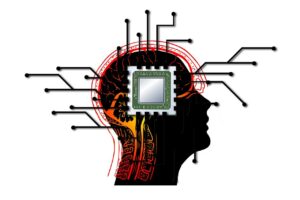Human Brain vs CPU: A Deep Dive into Capabilities, Limitations, and the Future
Introduction
The comparison between the human brain and a computer’s CPU (Central Processing Unit) is a fascinating topic that bridges biology, technology, and philosophy. Both are incredibly powerful processing systems, but they operate in fundamentally different ways.
✅ Processing Power: Brain vs CPU
✅ Memory & Learning: Biological vs Digital
✅ Energy Efficiency & Speed
✅ Can AI Ever Truly Replicate Human Thought?
✅ Future of Brain-Computer Interfaces (BCIs)

1. Processing Power: Brain vs CPU
Human Brain (Biological Processing)
Neurons: ~86 billion neurons, each with ~1,000 synapses (connections).
Parallel Processing: Handles multiple tasks simultaneously (e.g., breathing, thinking, moving).
Neuroplasticity: Can rewire itself based on experiences (learning, recovery from injury).
CPU (Digital Processing)
Transistors: Billions in a single chip (e.g., Apple M2: 20 billion transistors).
Serial Processing: Executes tasks sequentially (but modern CPUs use multi-core parallelism).
Fixed Architecture: Cannot physically reconfigure itself like a brain.
Key Difference:
The brain excels at general intelligence, creativity, and adaptability.
CPUs outperform in raw speed, precision, and repetitive tasks.
2. Memory & Learning: Biological vs Digital
| Feature | Human Brain | CPU & RAM |
|---|---|---|
| Storage | ~2.5 PB (estimated) | Up to terabytes (SSD/HDD) |
| Speed | Slow recall (~0.1s) | Near-instant (nanoseconds) |
| Learning | Adaptive, emotional | Algorithmic, data-driven |
Why the Brain Wins in Some Areas:
Associative Memory: Connects unrelated concepts (e.g., smell → memories).
Emotional Context: Learns from pain, pleasure, and experiences.
Where CPUs Dominate:
Perfect Recall: No “forgetting” like humans.
Instant Access: Retrieves data in nanoseconds.
3. Energy Efficiency & Speed
Brain Efficiency
Power Usage: ~20 watts (equivalent to a dim lightbulb).
Performance: Handles complex tasks (e.g., recognizing faces) with minimal energy.
CPU Efficiency
Power Usage: 35W (laptop CPU) to 300W+ (high-end desktops).
Performance: Faster at math (e.g., a CPU calculates 1+1 in 0.000000001s, while the brain takes ~0.1s).
Winner?
Brain: More energy-efficient for complex cognition.
CPU: Faster for structured computations.
4. Can AI Ever Replicate Human Thought?
Current AI vs Human Brain
AI Strengths:
Crunches data faster (e.g., GPT-4 processes text instantly).
Never gets tired (unlike human fatigue).
AI Weaknesses:
Lacks consciousness, emotions, and true creativity.
Requires massive datasets (humans learn from few examples).
The Consciousness Debate
Some experts (like Ray Kurzweil) believe AI will match human intelligence by 2045 (Singularity).
Others argue subjective experience (qualia) may never be replicated.
5. The Future: Brain-Computer Interfaces (BCIs)
Companies like Neuralink (Elon Musk) and Meta are working on BCIs to merge brains and computers:
Neuralink: Aims to treat paralysis, then enhance cognition.
Meta’s Wristband: Controls AR/VR via neural signals.
Will Humans Become Cyborgs?
Short-term: Medical applications (e.g., restoring movement).
Long-term: Potential for enhanced memory, instant learning, or even digital immortality.
Conclusion: Who Wins?
| Aspect | Human Brain 🧠 | CPU 💻 |
|---|---|---|
| Creativity | ✅ | ❌ |
| Speed | ❌ | ✅ |
| Adaptability | ✅ | ❌ |
| Precision | ❌ | ✅ |
Final Verdict:
For now, the brain is unmatched in general intelligence.
CPUs rule in speed, accuracy, and scalability.
The future may lie in merging both (BCIs).